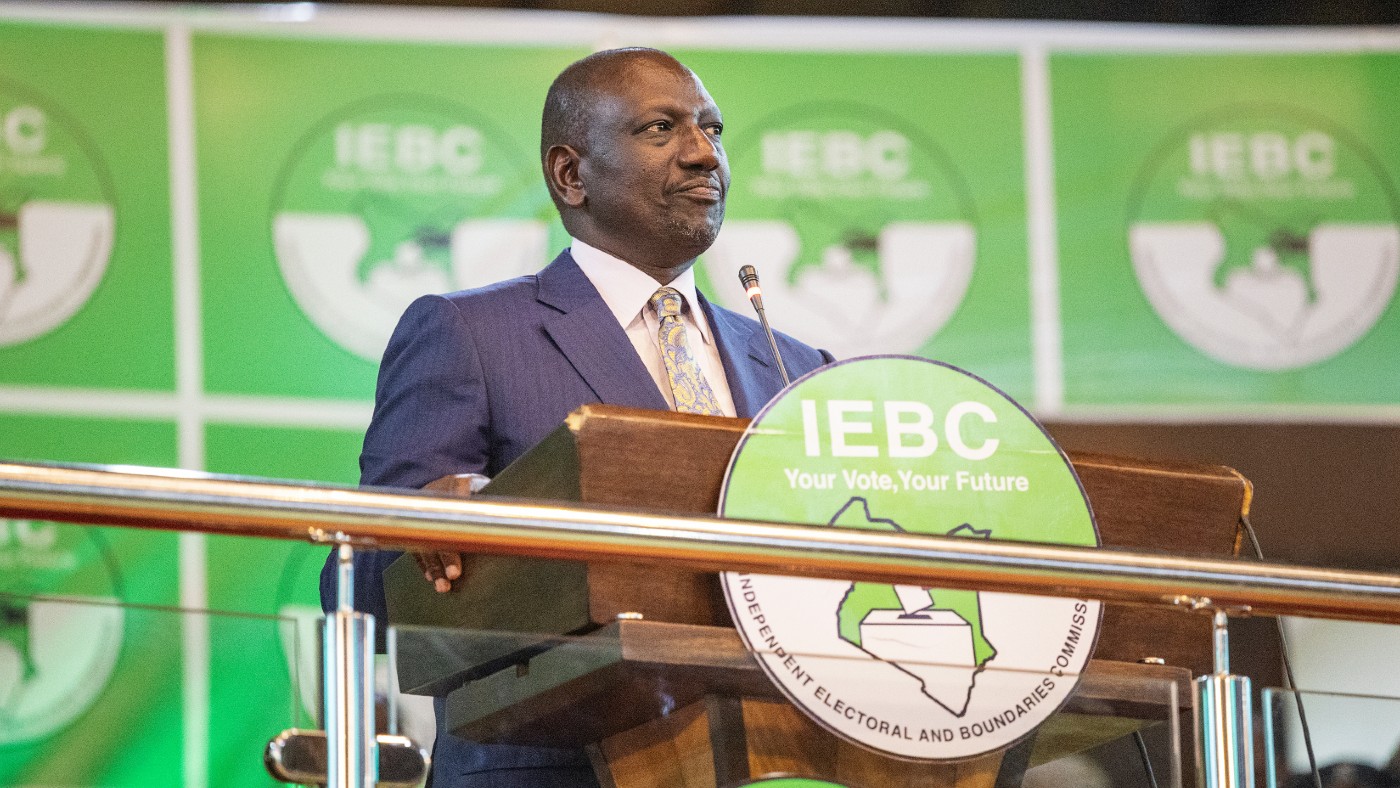Victory for William Ruto, Kenya’s self-made ‘hustler’
Ruto, representing the Kenya Kwanza Alliance, won 50.5% of the vote in the country’s presidential election

A free daily email with the biggest news stories of the day – and the best features from TheWeek.com
You are now subscribed
Your newsletter sign-up was successful
“Save for a few mostly inconsequential skirmishes, and one unfortunate murder”, Kenya’s presidential election campaign had passed pretty smoothly, said The EastAfrican (Nairobi). The race, which pitted deputy president William Ruto against the veteran opposition leader Raila Odinga, was largely free of the violence that has marred previous polls in Kenya. “There was no overt abuse of incumbency” or “harassment of opponents or their agents” as the ballots were cast and counted, slowly, over six days.
But when Ruto was declared the winner, “chaos erupted”, said Peter Fabricius in Daily Maverick (Johannesburg). “Fistfights broke out on the stage of the official counting centre, two electoral commissioners were injured and four dissociated themselves from the results, saying the final counting had been ‘opaque’.”
It was a narrow victory: Ruto, representing the Kenya Kwanza Alliance, won 50.5% of the vote, while Odinga, of the One Kenya Coalition Party, was awarded 48.8%. Odinga will challenge it in court but, barring any shocks, Ruto looks set for the presidency. In a victory speech, he vowed to “look to the future”, and thanked his “boss”, outgoing president Uhuru Kenyatta, who had turned against him and backed Odinga during the campaign.
The Week
Escape your echo chamber. Get the facts behind the news, plus analysis from multiple perspectives.

Sign up for The Week's Free Newsletters
From our morning news briefing to a weekly Good News Newsletter, get the best of The Week delivered directly to your inbox.
From our morning news briefing to a weekly Good News Newsletter, get the best of The Week delivered directly to your inbox.
This “knife-edge” race was cast as a battle between “hustlers” and political “dynasties”, said Maureen Kinyanjui in The Star (Nairobi). While Odinga and Kenyatta are sons of Kenyan independence heroes, the triumphant Ruto is a rags-to-riches figure. As a barefooted schoolboy, he sold chickens by the side of the road; yet he later became one of Kenya’s wealthiest businessmen, acquiring a massive chicken plant and a luxury hotel.
“On the campaign trail, Ruto skilfully avoided ethnicity, a major factor in Kenyan politics,” said Eromo Egbejule and Immaculate Akello on Al Jazeera (Doha). Instead, the God-fearing teetotaller “framed the narrative as a class war between the haves and have-nots”.
He pushed a populist “Kenya First” programme, and weaponised his country’s high unemployment, promising to grow the economy from the bottom up. His strategy of getting “Kenyans to vote to protect their bellies and not their blood ties” has paid off: for the first time, millions of voters crossed ethnic lines.
An eloquent politician with a “prodigious ability to organise and inspire”, Ruto may prove a capable leader, said The Economist. “But he also has the whiff of the strongman about him.” After disputed elections in 2007, he was charged by the International Criminal Court with helping to instigate violent clashes that killed more than 1,300 people. And while the case was later suspended, the court “pointedly declined to acquit” Ruto, noting claims of witness intimidation.
A free daily email with the biggest news stories of the day – and the best features from TheWeek.com
He has also been “dogged by allegations of corruption”. Kenya has been on the up in recent years, said Charles Onyango-Obbo in Nation (Nairobi). Access to education and electricity is rising, and economic growth has been steady. But most Kenyans aren’t yet feeling the benefits. Ruto has convinced voters for now – but as food prices soar and a debt crisis looms, he has a very tough job ahead of him.
-
 Why is the Trump administration talking about ‘Western civilization’?
Why is the Trump administration talking about ‘Western civilization’?Talking Points Rubio says Europe, US bonded by religion and ancestry
-
 Quentin Deranque: a student’s death energizes the French far right
Quentin Deranque: a student’s death energizes the French far rightIN THE SPOTLIGHT Reactions to the violent killing of an ultraconservative activist offer a glimpse at the culture wars roiling France ahead of next year’s elections
-
 Secured vs. unsecured loans: how do they differ and which is better?
Secured vs. unsecured loans: how do they differ and which is better?the explainer They are distinguished by the level of risk and the inclusion of collateral
-
 Epstein files topple law CEO, roil UK government
Epstein files topple law CEO, roil UK governmentSpeed Read Peter Mandelson, Britain’s former ambassador to the US, is caught up in the scandal
-
 Iran and US prepare to meet after skirmishes
Iran and US prepare to meet after skirmishesSpeed Read The incident comes amid heightened tensions in the Middle East
-
 Israel retrieves final hostage’s body from Gaza
Israel retrieves final hostage’s body from GazaSpeed Read The 24-year-old police officer was killed during the initial Hamas attack
-
 China’s Xi targets top general in growing purge
China’s Xi targets top general in growing purgeSpeed Read Zhang Youxia is being investigated over ‘grave violations’ of the law
-
 Panama and Canada are negotiating over a crucial copper mine
Panama and Canada are negotiating over a crucial copper mineIn the Spotlight Panama is set to make a final decision on the mine this summer
-
 Why Greenland’s natural resources are nearly impossible to mine
Why Greenland’s natural resources are nearly impossible to mineThe Explainer The country’s natural landscape makes the task extremely difficult
-
 Iran cuts internet as protests escalate
Iran cuts internet as protests escalateSpeed Reada Government buildings across the country have been set on fire
-
 US nabs ‘shadow’ tanker claimed by Russia
US nabs ‘shadow’ tanker claimed by RussiaSpeed Read The ship was one of two vessels seized by the US military